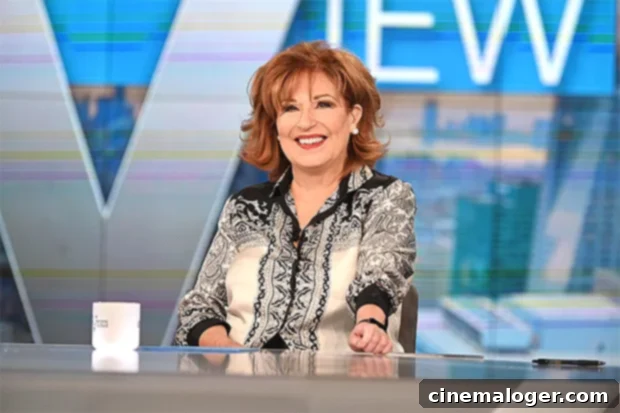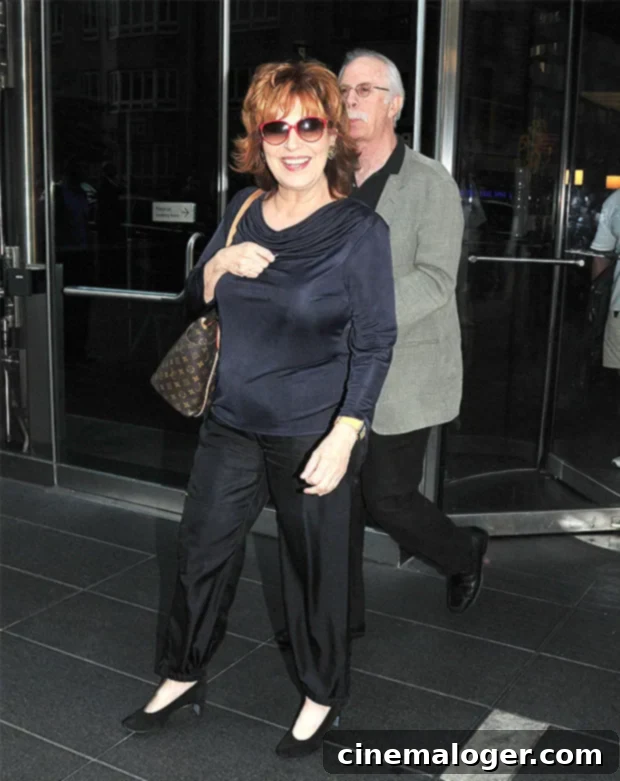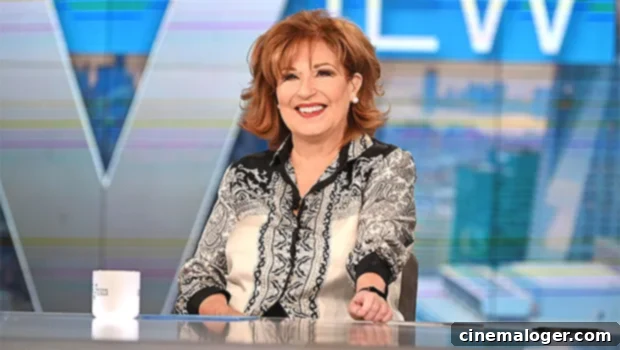Joy Behar’s Bold Advice: Why Older Women Should Marry Younger Men and The View’s Age Gap Debate
During a recent lively discussion on ABC’s daytime talk show, The View, the perennial topic of age gaps in dating once again took center stage, sparking humorous exchanges and candid confessions among the co-hosts. While society often spotlights relationships where men date significantly younger women, veteran comedian and panelist, Joy Behar, 78, offered a refreshingly contrarian and decidedly practical piece of advice for her female audience: consider marrying a younger man. Her recommendation, delivered with characteristic wit and charm, quickly became a highlight of the broadcast, prompting both laughter and thoughtful reflection on evolving relationship dynamics and societal norms.
The spirited debate was ignited by a Reddit post that questioned the appropriateness of a romantic relationship between a 30-year-old and a 19-year-old. This common scenario often opens a Pandora’s Box of opinions regarding maturity levels, life stages, and potential power imbalances. However, Behar skillfully steered the conversation in an unexpected direction, drawing upon her own personal experience to advocate for the benefits of a reverse age gap. Her husband, Steve Janowitz, whom she married in 2011, is seven years her junior, a fact she proudly uses to underscore her argument for the practical advantages of a younger partner as one navigates the later stages of life.
Joy Behar’s advocacy for younger male partners isn’t just a quirky personal preference; she frames it with a blend of humor and pragmatism. During the Wednesday, October 6 episode of The View, she articulated her stance with undeniable clarity and a mischievous twinkle in her eye. “I believe a woman should marry a man who’s younger than she is,” Behar declared, immediately capturing the audience’s attention. She didn’t stop there, elaborating on the real-world advantages that become increasingly apparent with age, particularly for women who are typically expected to take on traditional caregiving roles or shoulder certain physical burdens within a household. Her advice resonated deeply, prompting smiles and knowing nods from viewers who appreciated her candidness.
Behar’s rationale is rooted in a pragmatic understanding of the aging process and the need for support. As she humorously put it, referencing her husband Steve, “He’s seven years younger than me, and at this point, it’s really paying off, because carrying the bundles — I’m not wheeling anybody around. Let them wheel me around!” This lighthearted yet poignant remark encapsulated her core message: a younger partner can provide crucial physical assistance and companionship as one grows older, shifting the traditional dynamic where an older man might rely on a younger wife for care. This perspective challenges conventional expectations and encourages women to consider their long-term needs and desires when selecting a partner.
The laughter from her co-hosts indicated that Behar had struck a chord. Her insight extends beyond mere physical support; it touches upon the energetic and dynamic contributions a younger partner can bring to a relationship. An age gap where the woman is older can often mean a partner with more vitality, potentially a different outlook on life, and a willingness to engage in activities that might keep both individuals feeling youthful and engaged. This dynamic can be incredibly enriching, fostering a relationship built on mutual support and a refreshed perspective, rather than one defined solely by societal expectations. Joy’s openness about her own marriage serves as a powerful testament to the viability and benefits of such arrangements.

The discussion on The View further revealed that Joy Behar is not alone in her relationship philosophy. Both fellow co-hosts, Sara Haines and Sunny Hostin, readily chimed in to affirm that their own husbands are also younger than them. This collective experience among the panel members added significant weight to Behar’s advice, transforming it from a singular opinion into a shared sentiment among successful, accomplished women. Their personal anecdotes provided a powerful counter-narrative to the prevailing cultural norms, suggesting that such relationships are not only viable but can be deeply fulfilling and advantageous.
Joy Behar further underscored the tangible benefits, particularly for women, by reiterating the utility of having someone younger to “lift and carry” the heavier burdens that life inevitably presents. This practical aspect is often overlooked in romantic narratives, which tend to focus solely on emotional and intellectual compatibility. By highlighting the physical support a younger partner can offer, Behar brought a refreshing dose of reality to the discussion. Her ultimate message to women was clear and empowering: “Most women go for older guys. I’m putting it out there: be smart, ladies.” This exhortation encourages women to reconsider traditional dating patterns and make choices that serve their best interests, not just societal expectations.
As the conversation shifted, the co-hosts turned to Whoopi Goldberg, inviting her perspective on dating younger individuals. Whoopi, known for her candidness and unique insights, responded with a characteristic quip that brought another round of laughter: “It depends on my mood.” While humorous, her initial response cleverly hinted at a deeper, more nuanced philosophy of relationships. She quickly elaborated, emphasizing that age, while a factor, ultimately takes a backseat to the individual’s character and the quality of the connection. Whoopi’s viewpoint introduced a vital layer of complexity, moving beyond the purely practical considerations that Behar had highlighted.
Whoopi Goldberg articulated a view that many relationship experts endorse: genuine compatibility transcends numerical differences. “Sometimes you meet somebody who is younger than you,” she explained. “It’d be perfect if everybody was well-matched and well put together, but they’re not. You find it where you find it, and it may last a long time, and it may not.” Her statement underscores the unpredictable nature of love and human connection, suggesting that rigid age guidelines are often impractical and can limit one’s potential for happiness. This perspective champions individuality and the organic unfolding of relationships, free from societal pressures and preconceived notions about ideal pairings. It’s a reminder that true connection is often found in unexpected places, regardless of birth certificates.

Whoopi Goldberg then shared a hilarious and highly relatable anecdote about dating a “younger dude,” as she affectionately described him. This story served to illustrate the potential challenges and comedic moments that can arise from significant generational gaps. Her younger partner, in a moment of genuine confusion, once confessed that he didn’t know Paul McCartney “had another band,” a clear reference to the legendary Beatles. This revelation sparked laughter but also highlighted a common reality: differing life experiences and cultural references can sometimes create amusing, and occasionally frustrating, communication hurdles in age-gap relationships.
This anecdote, while funny, served a greater purpose in Whoopi’s commentary. She distilled the essence of the experience into a valuable piece of advice: “You have to know when you’re going younger, there’s a lot of information that you have to impart, and sometimes, it’s tiring.” This highlights the often-unspoken labor involved in bridging generational divides. From pop culture touchstones and historical events to technological shifts and social norms, an older partner might find themselves in the role of an educator, constantly explaining contexts that are self-evident to their generation but entirely new to a younger one. While this can lead to fresh perspectives and mutual learning, it can also demand patience and energy.
The discussion on The View, catalyzed by Joy Behar’s forthright advice, delves into a fascinating aspect of modern relationships: the evolving perceptions and realities of age gaps. Traditionally, relationships with older men and younger women have been more widely accepted, almost normalized, across many cultures. However, when the tables are turned, and older women choose younger male partners, they often face scrutiny or curiosity. Joy Behar’s unapologetic stance, supported by her co-hosts’ similar experiences, actively challenges these ingrained biases, prompting a re-evaluation of what constitutes an “appropriate” age difference in a romantic partnership. This is particularly relevant in a society that increasingly values individual choice and happiness above rigid conventions.
Beyond the humor, the conversation on The View touched upon several psychological and sociological facets of age-gap relationships. For older women, choosing a younger partner can signify a reclamation of agency, a pursuit of vitality, and a rejection of ageist expectations that often marginalize women as they get older. These relationships can offer a sense of rejuvenation, shared adventures, and a fresh outlook on life. Conversely, younger men might be drawn to older women for their emotional maturity, life experience, confidence, and established sense of self. These are qualities that might be less developed in peers of their own age, offering a different kind of connection than what they might find in a conventional age-matched relationship.
However, it’s also important to acknowledge that age-gap relationships, particularly those with older women and younger men, are not without their complexities. Societal perceptions can still be judgmental, leading to external pressures that couples must navigate. Assumptions about motives, such as financial gain or a “trophy” partner, can unfortunately overshadow the genuine affection and compatibility that often exist. The panel’s discussion, especially Whoopi’s point about “imparting information,” underscores that cultural and generational differences can require conscious effort to bridge. Partners must be willing to learn from each other, appreciate different perspectives, and navigate potential disparities in life stages, such as career development, family planning, or social circles.
Ultimately, the rich discussion on The View highlighted that while there might be practical advantages or humorous challenges associated with age gaps, the bedrock of any successful relationship remains consistent: mutual respect, shared values, effective communication, and genuine affection. Joy Behar’s humorous and practical advice to “be smart, ladies” is a call to prioritize one’s own well-being and happiness. Whoopi Goldberg’s more philosophical approach reminds us that love is found in varied forms and that judging a relationship solely by the number of years between partners is to miss the essence of human connection. The show’s segment served as a valuable reminder that love, in its many manifestations, defies simple categorization and thrives on individual compatibility above all else.
In conclusion, The View once again provided a platform for an engaging and thought-provoking conversation, challenging conventional dating wisdom through the personal anecdotes and witty observations of its dynamic co-hosts. Joy Behar’s spirited endorsement of younger husbands, rooted in her own fulfilling marriage, offered a refreshing perspective on navigating the practicalities of aging within a partnership. Her call for women to strategically choose partners who can provide energetic support subtly encouraged them to prioritize their own long-term needs and desires, rather than adhering to outdated societal expectations.
Coupled with Sara Haines and Sunny Hostin’s corroborating experiences, and Whoopi Goldberg’s insightful reminders that compatibility and individual character ultimately trump numerical age differences, the segment collectively presented a multifaceted view on age-gap relationships. It highlighted that while generational differences can present unique hurdles, they also offer opportunities for growth, learning, and profound connection. Ultimately, the consensus from the panel underscored a universal truth: while age might be a factor in who we choose to love, it is the quality of the bond, the shared laughter, and the unwavering support that truly define a lasting and happy relationship, regardless of the numbers on a birth certificate.
